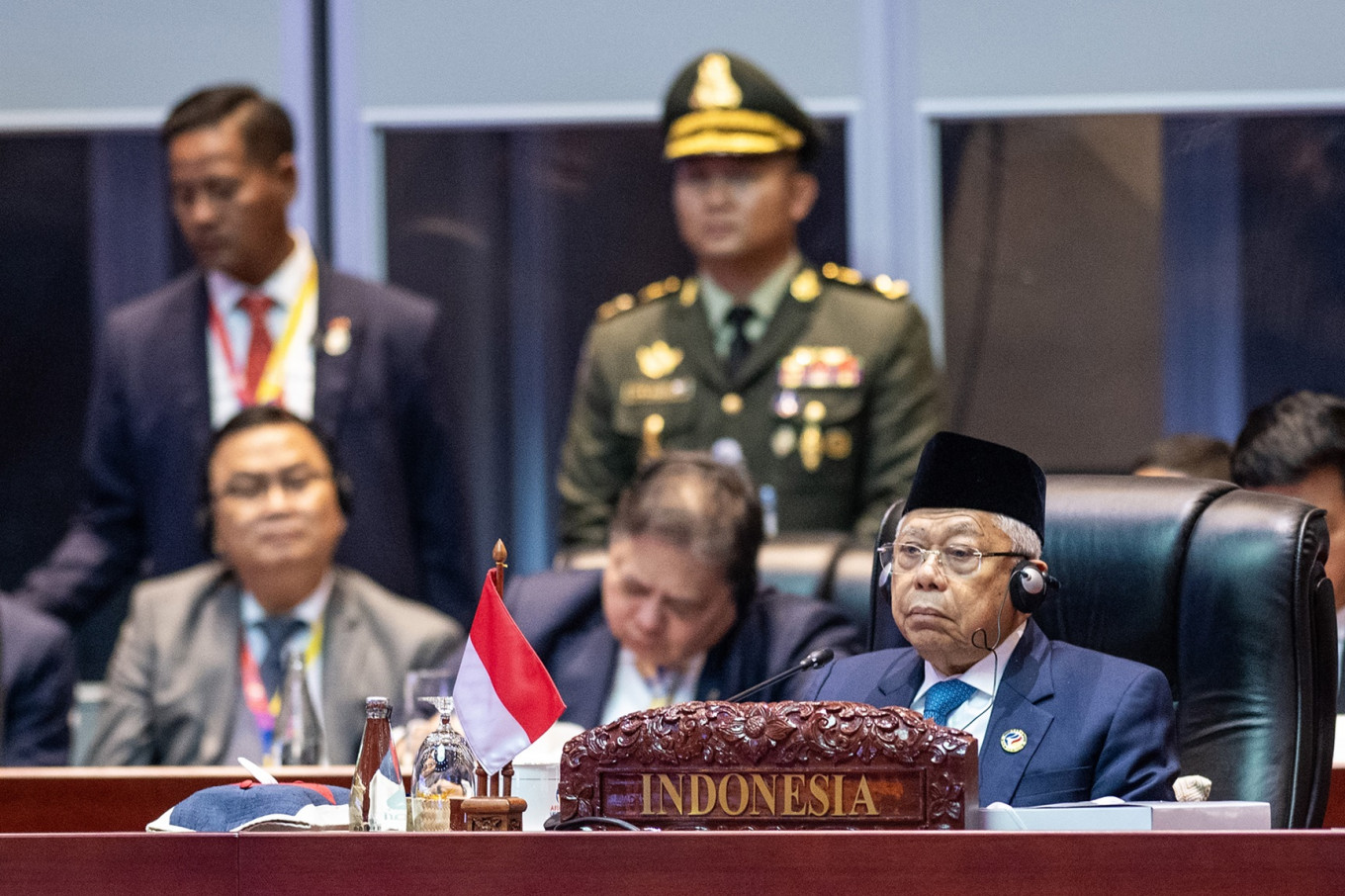Popular Reads
Top Results
Can't find what you're looking for?
View all search resultsPopular Reads
Top Results
Can't find what you're looking for?
View all search resultsThanks Laos, welcome Malaysia
Malaysian Prime Minister Anwar Ibrahim has a vast knowledge of ASEAN, and we hope he can not only conclude the bloc’s unfinished business but also create a more solid foundation for the group’s 2045 vision.
Change text size
Gift Premium Articles
to Anyone
L
aotian Prime Minister Sonexay Siphandone handed over ASEAN’s rotary chairmanship to Malaysian Prime Minister Anwar Ibrahim on Friday after closing the bloc’s leaders’ summit and meetings with dialogue partners in Vientiane. Laos deserves commendation for its success in leading the regional bloc over the past year.
Siphandone proved his country’s economic and political influence in the region despite its small geographic size and GDP compared to Indonesia, the largest economy in Southeast Asia. The Laotian leaders have done their best and complied with all the principles agreed upon by the ASEAN leaders at the previous summit in Jakarta.
On the Myanmar issue, for instance, critics had wrongly predicted that Laos would opt for a soft approach in dealing with the military junta, which has been barred from attending all official ASEAN forums for failing to respect the bloc’s five-point consensus for peace, which includes the restoration of democracy and a cessation of hostilities in the strife-torn nation. The junta was allowed to send a career diplomat to the summit last week only with the prior approval of all ASEAN leaders.
At the East Asia Summit, an annual leadership meeting between ASEAN and its dialogue partners including China, Japan, South Korea, India, Canada, Australia and India, the leaders issued a joint statement that covered various sensitive issues, such as the recent developments in the Korean Peninsula and Russia’s invasion of Ukraine.
Regarding the South China Sea dispute, the leaders emphasized the importance of self-restraint in the conduct of all claimants and other states, “including those mentioned in the 2002 Declaration on the Conduct of Parties in the South China Sea (DOC) that could further complicate the situation and escalate tensions in the South China Sea".
Malaysia will officially start its ASEAN chairmanship in January and has revealed an official logo as well as the theme “Inclusivity and Sustainability” for its tenure. PM Anwar has a vast knowledge of ASEAN, and we hope that he can not only conclude ASEAN’s unfinished business but also create a more solid foundation for the group’s bid to realize its 2045 vision.
In the meantime, Indonesia will very likely take a more progressive approach to ASEAN under the leadership of Prabowo Subianto than during the 10-year presidency of Joko “Jokowi” Widodo, who will leave office on Oct. 20. Adding to his numerous missed opportunities, Jokowi decided to skip the ASEAN summit.
There are several unfinished agenda items that ASEAN needs to address soon, rather than later.
First is the ravaging civil war in Myanmar. Newly elected Thai PM Paetongtarn Shinawatra has offered to host an informal meeting on Myanmar in December. ASEAN can no longer rigidly stick to the five-point consensus as the only currency in dealing with the Myanmar military junta.
The Thai PM rightly proposed the more active involvement of larger neighbors such as China and India in ending the systematic atrocities by both the military and rebel groups. Indonesia should actively engage with the Thai initiative.
Secondly, for the interests of both ASEAN and Timor-Leste, the accession of the nation should be accelerated and more affirmative action should be offered.
Both PM Siphandone and PM Anwar have declared their readiness to formalize Timor-Leste’s membership soon. Last week's summit was attended by Timor-Leste PM Xanana Gusmao.
There are no more excuses to delay the entry of Timor-Leste into ASEAN now that many countries and international agencies have offered their help for Timor-Leste to fulfill the requirements set by ASEAN. Singapore, which initially resisted the plan, has softened its stance.
Third is the contentious issue of the South China Sea. As ASEAN chair, Laos, unlike Cambodia, did not try to please China during the ASEAN summit.
ASEAN and China have agreed to expedite negotiations on the non-binding Code of Conduct on the South China Sea. Hopefully, this pledge is not just talk. The code of conduct would help the two parties build trust, which is sorely needed to maintain regional peace and stability.
Thank you Laos, and welcome new chair Malaysia.











